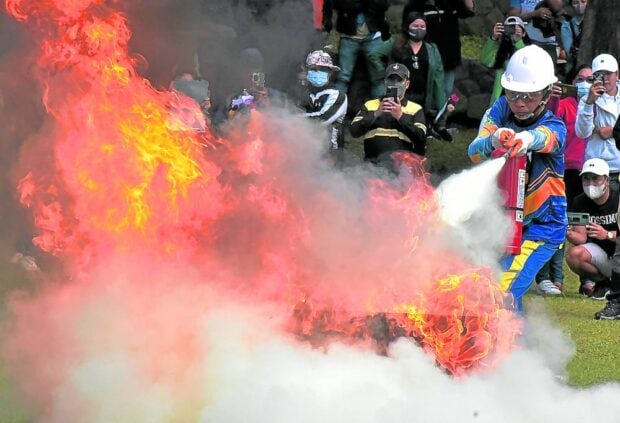
FIRE STOPPERS | Cordillera mines are among the industries allowed to continue operating to keep the economy afloat at the height of the coronavirus pandemic. As restrictions eased, miners from across the country displayed their firefighting skills in a miners’ skills competition during the Mine Safety and Environment Conference in Baguio City in November 2022. (File photo by EV ESPIRITU / Inquirer Northern Luzon)
BAGUIO CITY, Benguet, Philippines — The Cordillera mining industry performed poorly in 2022, making it more imperative to bring into the mainstream economy the black market operation of the region’s small-scale mining sector, government officials said.
The country’s oldest mining firms, including the century-old Benguet Corp., continue to operate their legacy mines in Benguet province but mining and quarrying slowed down with a 0.4-percent contraction (or negative growth) in last year’s gross regional domestic product, which measured the value of goods and services produced by the region in 2022, according to the National Economic and Development Authority (Neda).
The agriculture sector fared worse as it contracted by 2.1 percent, according to Villafe Alibuyog, Cordillera director of the Philippine Statistics Authority, who presented the region’s economic performance on April 27.
The mining industry slowdown despite the region’s 8.7-percent economic rebound last year has been attributed to “weak global demand” for metals at that time, as well as “supply chain constraints” arising from what is now the 15-month invasion of Ukraine by Russia, said Freda Toyoken, the economic development specialist of Neda in the Cordillera.
Gold production declined by 1.29 percent (from 2,736 kilograms in 2021 down to 2,701 kg last year), although the downturn was offset by world gold prices which shot up from P1,678 per troy ounce in 2021 to P1,801 last year, said Fay Apil, Cordillera director of the Mines and Geosciences Bureau (MGB).
Robust metals prices toward the end of 2022 raised the value of the Cordillera’s metallic mineral production by four percent from P13.6 billion in 2021 to P14.148 billion last year, she said.
Copper and silver also declined last year. Silver production dropped by 34 percent, just as world prices slid by 14.52 percent, Apil said, while a 5-percent drop in world copper prices occurred just as the region’s mines suffered a slight decrease in regional production.
Move to legalize
The sector’s performance does not reflect the production of small-scale mines in the Cordillera. But efforts to make pocket mining legal in the region were a good step toward improving the performance of the Cordillera metals sector in the near future, Toyoken said.
Legally, small-scale mines are required to sell gold only to the Bangko Sentral ng Pilipinas (BSP), which adds to the country’s gold reserves, but pocket miners have been transacting on the black market because most of them are still unlicensed.
“The current initiative of the BSP to return the sale of gold from small-scale mining operations to the formal sector and to ensure fair pricing [is anticipated to generate] a better estimate of mineral production in the region,” said Toyoken.
Apil said the target of legitimizing all Cordillera small-scale miners has taken a step closer with the approval of 13 Minahang Bayan (people’s mines) in the provinces of Apayao (6), Benguet (4), Abra (1), Kalinga (1) and Mountain Province (1).
Minahang Bayan are designated mining zones for artisanal and small-scale miners. However, only one pocket mining organization in the region has secured a mining contract, while another has acquired a provisional contract pending the submission of an environmental compliance certificate for their mine area.
According to the National Coalition of Small-Scale Miners in the Philippines, over 500,000 pocket miners operate throughout the country.
The government’s long-term plan is to develop downstream mineral processing industries and make use of minerals that are otherwise exported as raw ore to other countries, Apil said.
She said MGB is looking forward to developing nickel and copper manufacturing in Palawan and Surigao and the projected revival of steel smelting facilities for copper and iron in Leyte.

